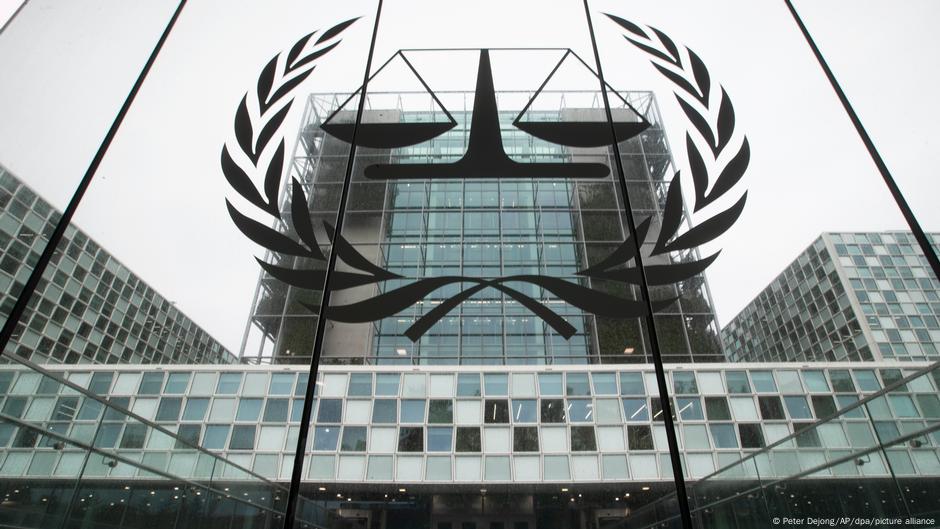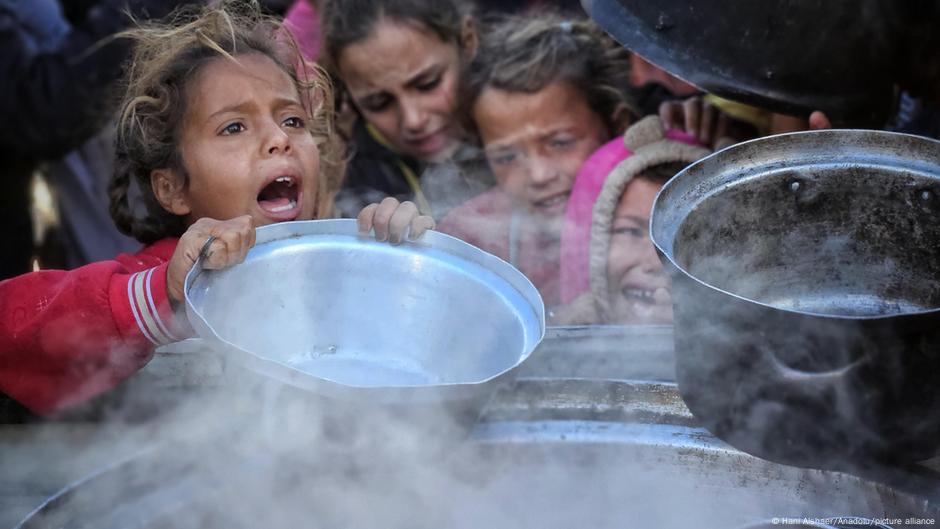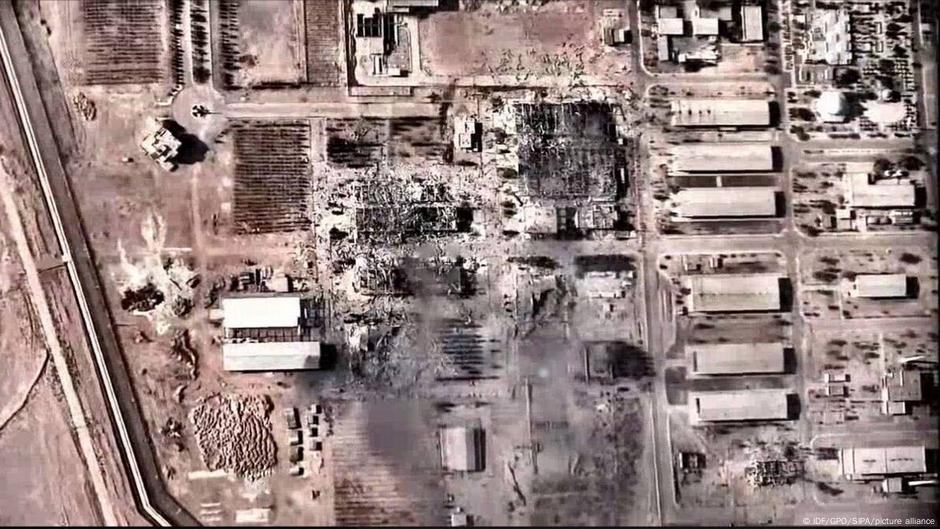Sursa: DW
Category: International
-
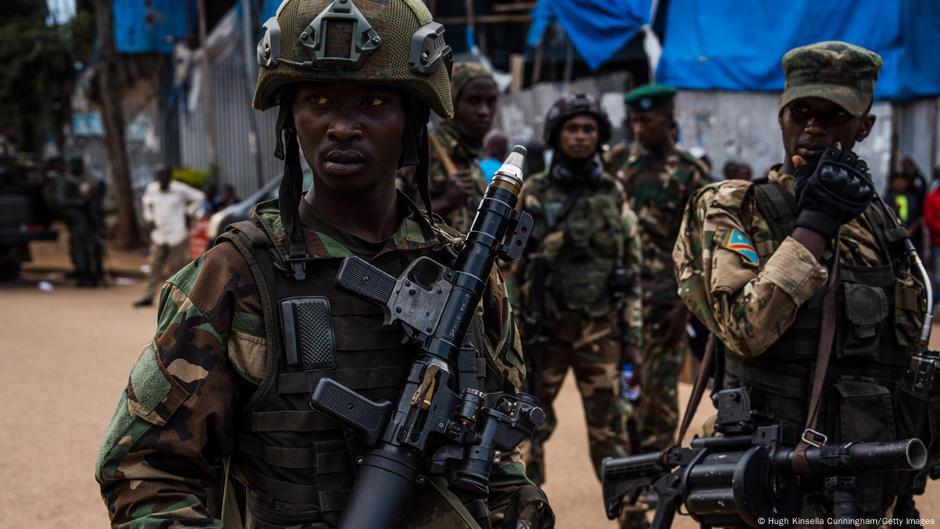
RD Congo: Puține speranțe pentru un armistițiu robust cu gruparea rebelă M23
The Doha Declaration of Principles , building on a peace deal Congo and Rwanda signed in Washington on June 27, was meant to serve as another “meaningful step toward advancing lasting peace and stability in the Great Lakes region,” according to the US Department of State.
Rwanda’s willingness to sign, and its passive observation of, the Doha agreement was seen as tacit admittance to its role in the long-standing conflict, although Kigali continues to deny its support of the M23.
DRC and Rwanda to sign peace deal after decades of violence
To view this video please enable JavaScript, and consider upgrading to a web browser that supports HTML5 video
Is the DRC a no-go zone?
Just one day after the signing in Doha, the US updated its security advisory for Congo and especially its capital, Kinshasa, advising US nationals in the country to “exercise increased awareness, avoid large gatherings, and monitor local news and security updates.”
The list of recommended actions include the provision of “enough food and water should you need to stay home for several days” and having “essential items (clothing, medications, travel documents) packed in a bag that you can carry.”
The advisory resembles the kind of advice US authorities issue residents to prepare for major natural disasters.
The June 27 peace deal between Congo and Rwanda sparked hope for the troubled region, but the deal with M23 rebels appears less promisingImage: Mark Schiefelbein/AP/dpa/picture alliance
Reagan Miviri, a conflict analyst and lawyer working with the Congo Research Group in Kinshasa — an independent, nonprofit research project — understands the importance of the US State Department’s latest travel advisory.
“The crisis in eastern Congo is also visible in Kinshasa in some ways,” she told DW. “Actors in the US [who] are worried about what could happen in Kinshasa … probably know much more than we do, so perhaps they have other information we don’t have.”
According to Lidewyde Berckmoes, an associate professor and senior researcher at the African Studies Center Leiden in the Netherlands, many parts of Congo still actively remain under the control of the M23, which is unlikely to change despite this deal.
“This region has seen many violent rebel movements, who have been there since the 1990s. There are many places where there’s a lot of tension, and where authority is contested,” Berkmoes, whose work is focused on Africa’s Great Lakes region, told DW.
M23 expansion course continues
On the ground, the reality of a state of war effectively continues to dictate daily lives in various parts of the country — especially eastern Congo’s North and South Kivu provinces. Mere days after the DRC-M23 truce was signed, fresh reports of M23 rebels seizing new ground surfaced.
According to UN-backed Radio Okapi in Congo, at least 19 civilians were killed by M23 fighters as part of that expansion, in particular around the village of Bukera.
This latest escalation is in clear breach of the Doha ceasefire deal, which calls on all sides in the conflict to stop efforts to expand their territorial gains — among various other stipulations.
DR Congo, M23 rebels agree on road map to peace
To view this video please enable JavaScript, and consider upgrading to a web browser that supports HTML5 video
A truce with an ambiguous message
Human rights activist Philemon Ruzinge believes the Doha deal will ultimately be of little consequence, despite whatever concessions Kinshasa may make to keep the peace.
“The agreement of principles is supposed to be … so important towards a lasting peace agreement,” he told DW, adding that the ongoing actions of M23 rebels leave little hope for it to work in the long run.
According to Ruzinge, M23 leaders feel they can continue to enjoy free reign over northeastern Congo on account of the text of the agreement “containing no withdrawal clause” and deliberately being worded in an ambiguous manner.
This view was only further solidified by the M23 itself, whose delegation leader at the signing in Doha, Benjamin Mbonimpa, reiterated that the group “will not retreat, not even by one meter.”
“We will stay where we are,” Mbonimpa said.
Urmărește cele mai importante știri
According to the UN, about 7 million people have been internally displaced in Congo due to the conflictImage: Luis Tato/AFP
Rebels trying to leverage political control
Researcher Berckmoes believes Mbonimpa’s attitude is indicative of the overall M23 position. “I don’t think M23 will let themselves be sidelined. Rather, I expect that they are looking for ways to have an important say as part of the government.”
Conflict analyst Miviri agrees, pointing out that “M23 are saying that they are not leaving.” She added that this should be taken at face value. “M23 will do whatever it pleases.”
That view is also shared by people in North Kivu province. Complaints by civil society groups about a lack of government intervention are mounting. In the province’s beleaguered capital, Goma, democracy activist Justin Murutsi told DW: “The state has a security mandate for the population. But when there are killings like this and no word from the state, it shows that there’s a serious institutional vacuum.”
“The signing of the Declaration of Principles gives us a little hope, because it clearly shows that the government has accepted the rebels’ demands and conditions,” said Julien, a resident of the city who believes M23 will remain in control of large parts of the region.
Goma residents endure hardships under rebel control
To view this video please enable JavaScript, and consider upgrading to a web browser that supports HTML5 video
Skepticism seems to outweigh hope
Political scientist Christian Moleka in Kinshasa wonders whether the parties the conflict are interested in peace. “Do the various parties even have the will to achieve lasting peace?” he told DW. “Are the follow-up mechanisms really going to work better than in the past, to support the full implementation of these various provisions?”
Berckmoes had similar reservations, stressing there has been “series of agreements in the past, which have not been upheld.” She added that for a sustainable peace plan to succeed, various parties and factions all have to be included in all negotiations — not just M23 but “all 160 groups” vying for control. To that end, Berckmoes believes “there’s still a long way to go.”
Miviri took an even more sober stance: “Before speaking of a lasting peace agreement, it just has to first happen. And I’m not seeing it happen, even now.”
Amid skepticism, criticism and the surge in violence since the Doha signing, there have also been a few hopeful voices — among them, the US senior adviser for Africa, Massad Boulos.
According to Congolese Interior Minister Jacquemain Shabani, significant progress has been made in recent weeks. He said he is convinced that, despite the ongoing volatile nature of the conflict, “we are close to peace.” In the same statement, however, he stressed that “peace is a choice,” which “requires work.”
Edited by: Benita van Eyssen
Correction, July 24, 2025: An earlier version of this article misspelled the name of Massad Boulos. DW apologizes for the error.
Sursa: DW
-
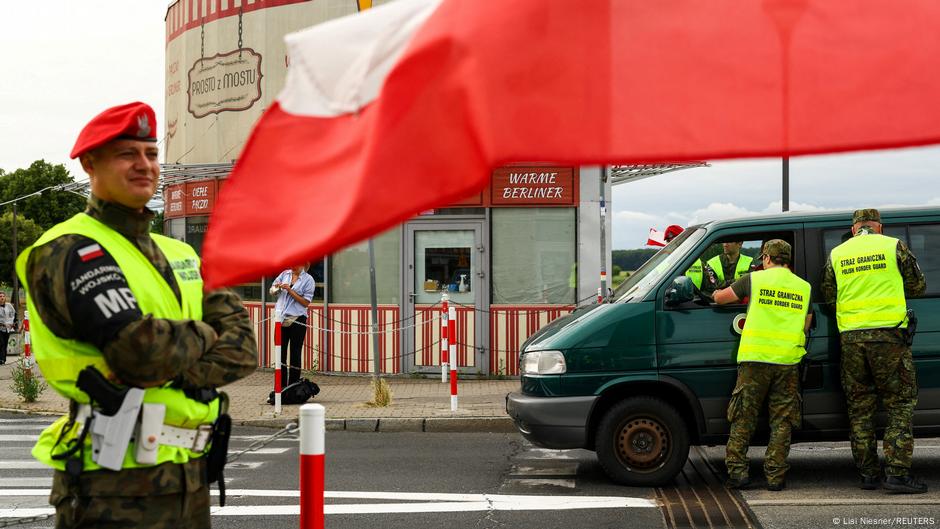
Actualizări Germania: Polonia va extinde controalele la frontieră
Meanwhile, Munich Airport is reportedly planning a special terminal to process migrant deportations
In other news, German Catholics have criticized the “catastrophic” humanitarian situation in Gaza
Welcome to DW’s coverage of the developments, backgrounders and analysis from Germany on Thursday, July 24.
Skip next section KLM Boeing 737 flight makes emergency landing in Hamburg07/24/2025July 24, 2025
KLM Boeing 737 flight makes emergency landing in Hamburg
The plane made the unscheduled landing after crew reported smoke coming from the engineImage: Bodo Marks/dpa/picture alliance
A passenger plane traveling from Stockholm to Amsterdam on Thursday was forced to make an emergency landing in Hamburg after smoke was reported coming from an engine.
The Boeing 737 operated by Dutch carrier KLM landed safely at Hamburg Airport, a spokeswoman said.
All passengers were able to disembark safely and unharmed, and were brought to the terminal by bus.
The incident forced takeoffs and landings at the airport to be suspended for about half an hour while the fire department dealt with the smoke.
Flight services at the airport in the northern German city have since resumed.
The cause and extent of the smoke was not clear, the airport spokeswoman said.
Boeing was the global leader in commercial aviation for decades, but it has struggled in recent years, often posting losses, due to supply chain issues and safety concerns.
https://p.dw.com/p/4xzmVSkip next section Poland to keep border checks with Germany, Lithuania07/24/2025July 24, 2025
Poland to keep border checks with Germany, Lithuania
Karl Sexton | Wesley Dockery EditorThe border checks are supposed to be temporaryImage: Attila Husejnow/SOPA Images/ZUMA/picture alliance
Poland is planning to keep police checks at its borders with Germany and Lithuania, Polish Interior Minister Tomasz Siemoniak said Thursday.
Passport and other border controls were abolished between European countries that are part of the Schengen Area.
But a number of EU countries, including Germany, Poland, Austria and the Netherlands, among others, have temporarily reintroduced the checks in recent months amid concerns over irregular migration.
Poland began the new border checks on July 7, and under Schengen rules, they are due to expire after 30 days.
Poland reintroduced the checks in response to a similar move by Germany in October 2023.
But Siemoniak told Polish news channel TVN24 that the controls “will certainly be extended.”
While Siemoniak, who has been in the post since May 2024, is due to be replaced as part of a Cabinet reshuffle by Prime Minister Donald Tusk, he will remain in charge of tackling irregular migration.
Since the border checks were reintroduced two weeks ago, the Polish border guard says over 100 people who were trying to enter the country irregularly from Germany or Lithuania have been refused entry. Over 70 of those had tried to enter from Germany.
Around 280,000 people and 134,200 vehicles have been randomly checked at the border since July 7, the border guard said.
In his remarks to TVN24, Siemoniak said migration was being weaponized by Russia and Belarus against the European Union.
“The migrants fly to Moscow with Russian visas. Then they are taken by bus to the Polish border, where the Belarusian authorities tell them what to do,” Siemoniak said. “And then they try to enter Poland.”
Can the EU’s Schengen agreement survive new border checks?
To view this video please enable JavaScript, and consider upgrading to a web browser that supports HTML5 video
https://p.dw.com/p/4xzOzSkip next section Left Party calls for special parliamentary debate after German government opts not to sign Gaza appeal07/24/2025July 24, 2025
Left Party calls for special parliamentary debate after German government opts not to sign Gaza appeal
Germany’s Left Party (Die Linke) has criticized the German government’s decision not to sign an appeal to end the war in the Gaza Strip immediately and called for a special parliamentary debate on the subject.
A total of 28 countries, plus the executive body of the European Union, the European Commission, have signed the appeal which calls on Israel to “adhere to its commitments in regards to international humanitarian law” by ending its war in Gaza.
Germany, however, is not among the signatories, arguing that the appeal is not explicit enough in naming the attack on Israel by the Palestinian militant group Hamas on October 7, 2023, as the cause of the war.
Left Party chairs Heidi Reichinnek and Sören Pellmann called the government’s failure to sign the appeal as “a complete admission of failure” and insisted: “Germany must also join the public pressure [on Israel] and finally turn words into actions.”
The far-left opposition party, which has 64 seats (10.16%) in the Bundestag, has also called for a special sitting of parliament’s Foreign Affairs Committee.
“The government continues to close its eyes to the suffering in Palestine and is not prepared to live up to its responsibility and act,” said Reichinnek and Pellmann, adding that lawmakers must be informed of “all information on the current situation” in Gaza.
Representatives of the center-left Social Democrats (SPD), including Development Minister Reem Alabali Radovan, and the environmentalist Green party have also called on the German government to sign the appeal.
Foreign Minister Johann Wadephul (CDU) has referred to constant, ongoing discussions between the German and Israeli governments concerning the latter’s actions in Gaza.
Germany reluctant to toughen stance toward Israel on Gaza
To view this video please enable JavaScript, and consider upgrading to a web browser that supports HTML5 video
https://p.dw.com/p/4xy7zSkip next section Euro 2025: DFB hails ‘successful’ tournament despite semifinal exit07/24/2025July 24, 2025
Euro 2025: DFB hails ‘successful’ tournament despite semifinal exit
The German Football Federation (DFB) says Euro 2025 was a “success” for Germany, despite Wednesday night’s dramatic semifinal defeat to Spain, and has backed head coach Christian Wück to lead the team into the future.
“We are one hundred percent convinced by Christian and his path,” said DFB President Bernd Neuendorf before the departure of the German delegation from Zürich on Thursday morning. “He aimed to bring about a transformation and we have to say he has succeeded.”
Germany lost 1-0 to Spain on Wednesday night, taking the world champions to extra-time just days after holding on for over 130 minutes with just ten players to beat France on penalties in a dramatic quarterfinal.
President Neuendorf was full of praise for the young German team, saying: “This is precisely the path we want to be on.”
An average of 14.26 million German viewers tuned into watch the semifinal, and head coach Wück said he was “proud” that his team had “generated such euphoria.”
Germany’s Federal President, Frank-Walter Steinmeier, who was in the stadium to support the team in person on Wednesday, called the players “true role models” and praised them for “playing this tournament with so much passion and footballing ability.”
Chancellor Friedrich Merz, who is known to be a supporter of Bundesliga side Borussia Dortmund, wrote on Instagram: “You fought until the very end … thank you for these brilliant football moments – we are proud of you!”
Spain will face reigning European champions England in the final on Sunday.
https://p.dw.com/p/4xxUfSkip next section Duisburg remembers Love Parade tragedy 15 years on07/24/2025July 24, 2025
Duisburg remembers Love Parade tragedy 15 years on
The western German city of Duisburg on Wednesday night marked the 15th anniversary of the Love Parade tragedy, which saw 21 people killed and more than 650 injured in a deadly crush at a music festival on July 24, 2010.
Although experts found numerous failings in the planning and authorization of the event, no individuals were ever brought to justice for one of the deadliest tragedies in modern German history.
After a decade-long investigation, charges of involuntary homicide and physical injury resulting from negligence brought against the city of Duisburg and the event organizers were dropped in 2020 on the grounds that no relevant blame could be leveled at any individuals. Rather, the court found that a “number of circumstances” led to the tragedy.
Wednesday night’s memorial event, which saw 1,000 candles lit for the victims, is likely to be the last of its kind, with the association responsible for organizing it set to be wound up.
“For some, the tenth anniversary was already the opportune moment to find closure,” said spokesperson Jürgen Widera, saying that the emotional need for an annual event was dropping off.
A permanent memorial at the site of the tragedy just south of Duisburg city center features the words “Liebe hört niemals auf” (Love never ends) in seven languages to reflect the mother tongues of the victims from Germany, the Netherlands, Italy, Spain, China and Australia.
Urmărește cele mai importante știri
Dealing with the Duisburg Love Parade disaster
To view this video please enable JavaScript, and consider upgrading to a web browser that supports HTML5 video
https://p.dw.com/p/4xxCuSkip next section Bavaria: Police make arrests on suspicion of COVID-19 medication fraud07/24/2025July 24, 2025
Bavaria: Police make arrests on suspicion of COVID-19 medication fraud
Police in the southern German state of Bavaria last week carried out raids and made arrests in connection with a suspected million-euro fraud case related to COVID-19 medication, it was confirmed on Thursday.
Raids took place at 16 premises in the Bavarian cities of Munich, Regensburg, Bamberg and Bayreuth, resulting in the arrest of two people who remain in custody on suspicion of selling the government-procured drug Paxlovid “outside the prescribed distribution mechanism” — in other words, on the black market — in 2023.
State prosecutors are investigating damages of up to €2.6 million (or asylum claims being made in Germany despite asylum having already been granted elsewhere in the European Union (EU).
“The federal police control bridges, motorways and major roads on the borders with Poland and Austria, checking for irregular entry attempts being made by migrants and asylum seekers,” said a spokesman. “But there’s a loophole at airports.”
The comments came after a report by Germany’s Funke media group revealed that around 8,000 recognized asylum seekers had applied for asylum in Germany between January and May this year, despite having already been granted asylum in Greece, which is also in the EU.
The Funke group obtained the figures from the German Interior Ministry, which said that a total of 26,000 such secondary applications had been made in 2024.
According to EU law governing “secondary migration” in the bloc’s free-movement Schengen zone, recognized asylum seekers may spend up to 90 days in another EU country, but may not make another application for asylum there.
“People who have been granted protection in Greece must make use of that protection there,” said a ministry statement.
In April, Germany’s Federal Administrative Court in Leipzig ruled that single, healthy migrants who are able to work could legally be deported to Greece, where the court said they would face no extreme hardship. The Greek government, however, has said it will not take back refugees who make asylum claims in Germany, even if they’ve first made claims in Greece.
Refugee aid organizations continue to speak of an “inhumane situation” for refugees in Greece. “No bed, no bread, no soap,” one such group told the Funke group, a “drastic formula” which “has not changed in years.”
Germany grapples with tougher asylum policy
To view this video please enable JavaScript, and consider upgrading to a web browser that supports HTML5 video
https://p.dw.com/p/4xwqeSkip next section Merz and Macron in German-French show of unity07/24/2025July 24, 2025
Merz and Macron in German-French show of unity
Merz has vowed to improve ties with FranceImage: Michael Kappeler/dpa/picture alliance
German Chancellor Friedrich Merz and French President Emmanuel Macron put on a show of unity during the latter’s visit to Berlin on Wednesday.
But while the two presented a united European front in response to tariff threats from US President Donald Trump and an intention to discuss corruption issues with Ukrainian President Volodymyr Zelenskyy, disagreements remain regarding the development of the joint Franco-German FCAS next-generation fighter jet and the condemnation of Israeli actions in Gaza.
“Big topics, great unity,” headlined German public broadcaster Tagesschau on Thursday morning, while Der Spiegel news magazine quipped: “No fish rolls, at least” – a reference to Macron’s visit to Germany in October 2023 when Merz’s predecessor Olaf Scholz treated him to a Fischbrötchen, a local Hamburg delicacy with an acquired taste.
Read more about what Merz and Macron discussed on DW.
https://p.dw.com/p/4xwoKSkip next section German Catholics criticize ‘catastrophic’ humanitarian crisis in Gaza07/24/2025July 24, 2025
German Catholics criticize ‘catastrophic’ humanitarian crisis in Gaza
The Central Committee of German Catholics (ZdK) said on Thursday that it was “appalled” by the suffering being endured by Palestinians in the Gaza Strip and called on the German government to ensure the enforcement of international law.
“The humanitarian situation for the civilian population in Gaza is catastrophic,” ZdK President Irme Stetter-Karp told the Redaktionsnetzwerk Deutschland (RND).
While acknowledging that Israel “has a legitimate right to defend itself against the terrorist organization Hamas,” she said that didn’t absolve the Israeli government from its responsibility to respect international law.
Stetter-Karp also said Israel’s military operations were impacting the civilian population to an “unjustifiable” extent and highlighted the acute threat of starvation, illness and death facing children in the besieged enclave.
“We are aghast that 875 Palestinians have been killed while trying to access aid at the distribution centers in Gaza,” she said. “This approach by the Israeli government must end immediately!”
Stetter-Karp also highlighted the plight of Palestinian Christians in the occupied West Bank, who she said were increasingly the targets of Israeli settler violence.
https://p.dw.com/p/4xwYwSkip next section Munich airport planning special deportation terminal07/24/2025July 24, 2025
Munich airport planning special deportation terminal
Germany’s second-largest airport is reportedly planning to construct a special deportation terminal in which police will process the repatriation of migrants to be deported.
According to a planning document seen by the Reuters news agency, the so-called “repatriation terminal” at Munich Airport is to be around 60 meters (about 200 feet) long and spread over two floors.
The facility, which is designed to facilitate “up to 100 arrivals and departures processing up to 50 individual measures and group charter flights daily,” is planned for 2028 and will also include a “central check-in in order to coordinate repatriations efficiently,” according to the said the deportation of those convicted of crimes to their home countries was a sensible measure. “Therefore I don’t think it’s fundamentally wrong to propose such a terminal,” he said.
But political support is not universal. Local Green party politician Gülseren Demirel told the Süddeutsche Zeitung broadsheet: “We are more than critical of a specific terminal for deportations.”
While you’re here: Every Tuesday, DW editors round up what is happening in German politics and society. You can sign up here for the weekly email newsletter, Berlin Briefing.
https://p.dw.com/p/4xwcgSkip next section Welcome to our coverage07/24/2025July 24, 2025
Welcome to our coverage
Matt Ford | Elizabeth Schumacher Editor
Guten Morgen! Welcome to DW’s coverage of developments in Germany on Thursday, July 24.
Despite Germany’s dramatic defeat in the Euro 2025 semifinal last night, we all have to carry on, so here’s what’s on the agenda today:
- The Central Committee of German Catholics (ZdK) has the criticized the “catastrophic” humanitarian situation in the Gaza Strip
- Munich airport is planning a special new deportation terminal where police can process migrants leaving Germany
- Everything else you need to know from Germany as it happens
https://p.dw.com/p/4xwWQKarl Sexton Writer and editor focused on international current affairsMatt Ford Reporter for DW News and Fact CheckSend us your feedback
Sursa: DW
-
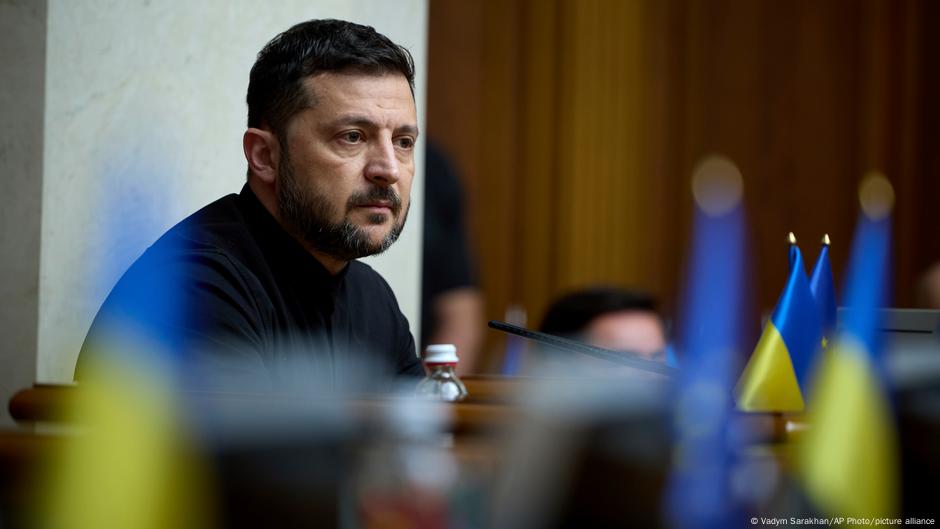
Ucraina: Zelenski susține noua lege anti-corupție după reacții negative
Versiunea anterioară a proiectului de lege a acordat guvernului mai multe puteri pentru a se concentra asupra activității organismelor de supraveghere anticorupție.
Ce a spus Zelenski despre noul text al proiectului de lege?
„Tocmai am aprobat textul unui proiect de lege care garantează o consolidare reală a statului de drept în Ucraina, independența organismelor anticorupție și o protecție fiabilă a statului de drept de orice influență sau interferență rusească”, a postat Zelenski pe X, promițând să trimită noul proiect de lege parlamentului joi.
„Este important să respectăm poziția tuturor ucrainenilor și suntem recunoscători tuturor celor care sunt alături de Ucraina”, a adăugat el.
Care a fost reacția ucrainenilor la legislația anterioară?
Decizia președintelui ucrainean de a elimina independența a două organisme anticorupție de mai devreme în Săptămâna a declanșat proteste la nivel național – primele tulburări la scară largă din țară de la începutul invaziei la scară largă a Rusiei în februarie 2022 – și critici din partea Uniunii Europene.
Mii de oameni au ieșit în străzile din Ucraina săptămâna aceasta pentru a protesta împotriva guvernului ucrainean pe fondul scandalului.
Protestatarii au evidențiat ceea ce au văzut ca o „revenire” la epoca președintelui pro-rus Viktor Ianukovici, care a fost forțat să fugă în Rusia în timpul Revoluției Euromaidan din 2014.
Oamenii din Kiev s-au manifestat împotriva implementării proiectului de lege, care ar reglementa activitatea Parchetului Special Anticorupție și a Biroului Național Anticorupție. Imagine: Danylo Antoniuk/Anadolu Agency/IMAGO
UE a fost un susținător cheie al Kievului de când Rusia a lansat invazia la scară largă a Ucrainei în februarie 2022, dar Bruxelles-ul a a mai spus că reformele sunt esențiale pentru o integrare europeană mai strânsă.
Cum a afectat controversa relațiile dintre UE și Ucraina?
Combaterea corupției este crucială pentru ambițiile Ucrainei de a adera la UE, obținând în același timp miliarde de dolari sub formă de ajutor occidental, în timp ce continuă să respingă invazia Rusiei.
Comisarul UE pentru extindere, Marta Kos, și-a exprimat miercuri îngrijorarea cu privire la legislația anterioară, descriind-o drept „un pas înapoi serios”.
Filiala ucraineană a Transparency International a condamnat decizia Parlamentului de a aproba inițial proiectul de lege inițial, spunând că aceasta dăunează uneia dintre cele mai semnificative reforme de la ceea ce Ucraina numește Revoluția Demnității, Revoluția Euromaidan, din 2014, adăugând în același timp că aceasta dăunează și încrederii partenerilor internaționali.
Rusia și Ucraina încheie scurte discuții de pace la Istanbul
Pentru a viziona acest videoclip, vă rugăm să activați JavaScript și să luați în considerare actualizarea la un browser web care acceptă videoclipuri HTML5
Editat de: Wesley Dockery
Sursa: DW
-
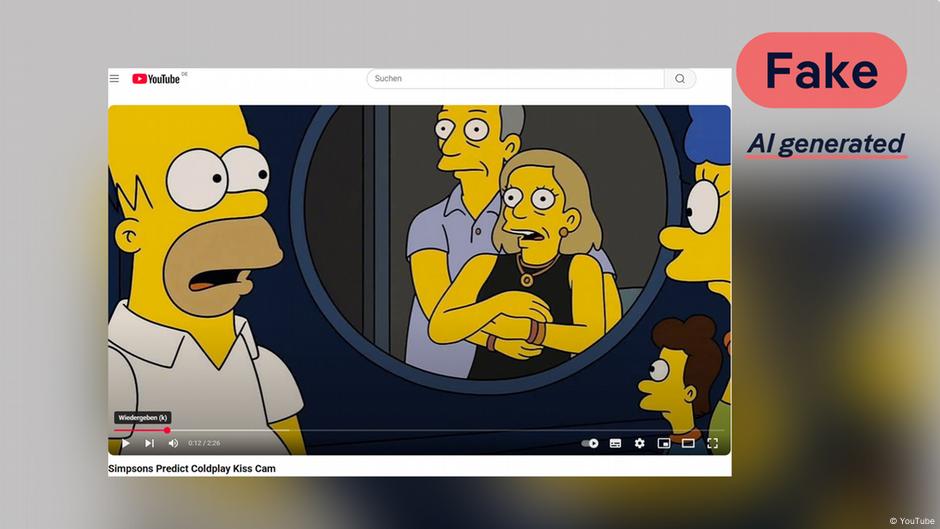
Verificare a faptelor: Au prezis „Simpsonii” o cameră video cu sărutul celor de la Coldplay?
Afirmație: „Chiar au prezis Simpsonii incidentul concertului Coldplay dintr-un episod din 2003?? (Presupusa aventură sau apariția CEO-ului Astronomer, Andy Byron, și a lui Kristin Cabot)”, spune această postare de pe X care include o filmare de pe camera de filmare a sărutului, alături de o imagine care pare să arate o scenă similară din desenul animat „Simpsonii”.
Verificare DW: Fals
Majoritatea versiunilor zvonului susțin că predicția a avut loc în sezonul 26, episodul 10, „Omul care a venit să fie la cină”. Episodul a fost difuzat pe 4 ianuarie 2015 și prezintă o intrigă în care familia Simpson este răpită de extratereștri în timp ce vizitează un parc de distracții. Episodul este disponibil pe platformele de streaming și pe YouTube aici. Totuși, în acest episod nu există o astfel de scenă.
Un alt episod, sezonul 17, episodul 22, „Marge și Homer își schimbă jocul de cuplu”, include într-adevăr o scenă cu o cameră de sărut, dar aceasta are loc la un meci de baseball, iar personajele care se sărută sunt Marge și Homer. Această scenă poate fi vizionată aici.
Prin urmare, presupusa captură de ecran cu predicție care circulă online este, cel mai probabil, generată de inteligența artificială sau manipulată digital. DW Fact Check a încărcat imaginea pe mai multe platforme de detectare a inteligenței artificiale, inclusiv AIorNot, care a etichetat-o drept „probabil generată de AI”. Hive Moderation a dat chiar o estimare de 99,9% „probabil să conțină conținut generat de AI sau deepfake”.
Atât Hive Moderation, cât și AI or Not, instrumente de detectare a inteligenței artificiale, identifică imaginile din „Simpsons” ca fiind generate de AI. Imagine: AI or Not/HIVE Moderation
Dar aceasta nu este prima dată când „Simpsons” ar fi prezis evenimente viitoare. Poate ați mai văzut unele dintre aceste afirmații virale:
Donald Trump ca președinte al SUA
Una dintre cele mai faimoase predicții din „Simpsonii” a fost că Donald Trump va deveni președintele Statelor Unite.
În sezonul 11, episodul 17, Lisa Simpson a făcut referire la președinția lui Donald Trump într-un episod difuzat inițial pe 19 martie 2000. În episod, a cărui acțiune se petrece în viitor, Lisa este actualul președinte al SUA și insinuează că magnatul imobiliar Trump a fost predecesorul ei și a provocat o criză bugetară. În 2015, presa a citat episodul ca o prefigurare a viitoarei candidaturi prezidențiale a lui Trump.
Captura de ecran din dreapta este dintr-un scurtmetraj numit „Trumptastic Voyage”, care a fost postat pe YouTube în iulie 2015. Imaginea din stânga este din iunie 2015. Imagine: X
Totuși, imaginea folosită adesea pentru a ilustra această „predicție prezidențială” este de fapt dintr-un scurt episod numit „Trumptastic Voyage”, din sezonul 25, difuzat în iulie 2015, după ce Trump își anunțase deja candidatura. Imaginea îi arată pe Trump și Homer pe o scară rulantă în fața unei mulțimi. Scena din desenul animat este bazată pe un eveniment real din iunie același an.
Citește mai multe știri pe top10stiri.ro
Prăbușirea podului Baltimore din 2024
O altă postare virală susținea că „Simpsonii” au prezis prăbușirea podului Baltimore din martie 2024, arătându-i pe Homer și Lisa urmărind desfășurarea evenimentului. La prima vedere, imaginea pare reală, dar diavolul se ascunde în detalii. Există mici indicii că această imagine este de fapt generată de inteligența artificială.
După prăbușirea podului din Baltimore din martie 2024, unele postări au devenit virale susținând că „Simpsonii” au prezis evenimentul. Imagine: X
Dacă te uiți mai atent la imagine, vei vedea că părul Lisei are 10 țepi, în timp ce personajul real al serialului de desene animate are doar opt. Părul lui Homer este, de asemenea, greșit – zig-zag-urile sunt vizibil mai înguste decât în serial.
Pandemia de COVID-19 în 2020
Mulți oameni au susținut, de asemenea, online că serialul a prezis pandemia de COVID-19. Ei se referă la sezonul 4, episodul 21, intitulat „Marge în lanțuri”. În episod, mulți locuitori din Springfield comandă storcătoare din Osaka, Japonia. Unul dintre muncitorii fabricii este bolnav și tușește în cutii, răspândind ceea ce devine cunoscut sub numele de „Gripa Osaka”.
În 2020, mulți utilizatori de social media au susținut că episodul „Marge in Chains” a prezis pandemia de COVID-19. Imagine: X
Singura asemănare dintre „Gripa Osaka” și COVID-19 este că ambele își au originea în Asia de Est. Gripa fictivă nu a dus la o carantină globală, la o pandemie sau la milioane de decese. Prin contrast, COVID-19 a fost mult mai grav, rezultând în peste 7 milioane de decese la nivel mondial, conform datelor înregistrate de Organizația Mondială a Sănătății.
Predicții neintenționate
Deși multe așa-numite „predicții ale Simpsonilor” care circulă online sunt fie atribuite greșit, fie fabricate, există într-adevăr mai multe cazuri în care serialul a nimerit-o sau s-a apropiat de realitate. Așadar, ce au spus talentele creative din spatele serialului despre acest fenomen? Creatorul serialului „Simpsonii”, Matt Groening, a explicat că scenariștii serialului încearcă să-și imagineze cele mai scandaloase rezultate posibile pentru poveștile lor.
„Am făcut atât de multe glume de-a lungul numeroaselor sezoane în care am fost în direct, încât în cele din urmă vom face ceva corect”, a spus el despre acest fenomen la un eveniment pentru fani în august 2024. „Scriem mereu glume despre lucrurile care se presupune că sunt cele mai absurde posibilități și se dovedește că așa este lumea în zilele noastre. Așa că totul pare să se adeverească.” El a adăugat, însă, că predicțiile nu sunt intenționate.
Editat de: Tetyana Klug
Sursa: DW
-
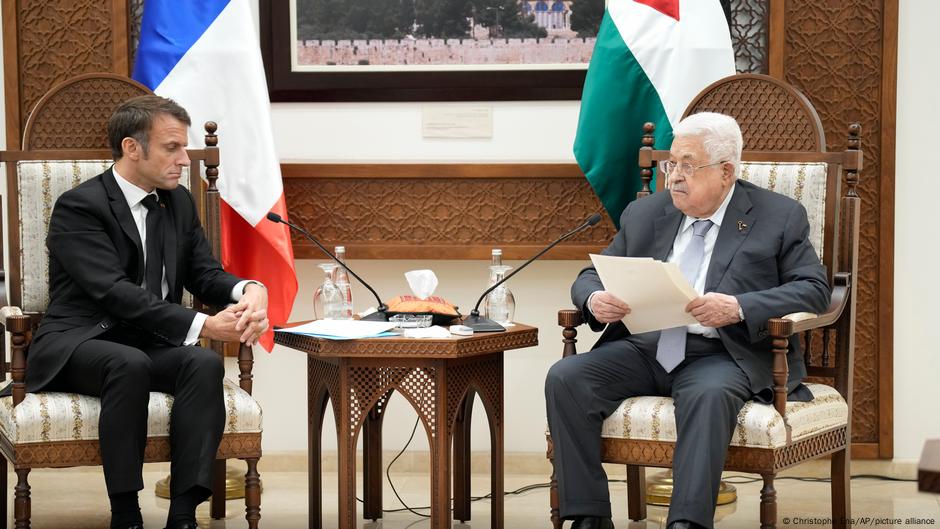
Orientul Mijlociu: Franța va recunoaște oficial statul palestinian
It comes as Gaza faces a severe humanitarian crisis, with media outlets urging Israel to open Gaza to journalists.
Meanwhile, Trump envoy Steve Witkoff said the US is withdrawing from Gaza ceasefire talks in Doha, Qatar. Witkoff accused Hamas of taking a “selfish position.” Hamas, which carried out the October 7, 2023 terror attacks, continues to hold Israeli hostages.
Here is a roundup of developments in Israel, Gaza and the wider Middle East on Thursday, July 24.
Skip next section Israeli defense minister: Macron’s support of Palestinian statehood ‘a disgrace and a surrender to terrorism’07/24/2025July 24, 2025
Israeli defense minister: Macron’s support of Palestinian statehood ‘a disgrace and a surrender to terrorism’
Israeli Minister of Defense Israel Katz has hit back over French President Emmanuel Macron’s statement that he will recognize a Palestinian state at the United Nations General Assembly in September.
“Macron’s announcement of his intention to recognize a Palestinian state is a disgrace and a surrender to terrorism, granting a reward and encouragement to the murderers and rapists of Hamas, who carried out the most horrific massacre of the Jewish people since the Holocaust,” Katz posted on X.
“Instead of standing with Israel in this time of trial, the French president is acting to weaken it. We will not allow the establishment of a Palestinian entity that would harm our security, endanger our existence, and undermine our historical right to the Land of Israel. We are all united to prevent this grave danger.”
https://p.dw.com/p/4xzxQSkip next section France will ‘recognize’ a Palestinian state, says Macron07/24/2025July 24, 2025
France will ‘recognize’ a Palestinian state, says Macron
France will recognize a Palestinian state at the UN General Assembly in September, President Emmanuel Macron said on Thursday.
“True to its historic commitment to a just and lasting peace in the Middle East, I have decided that France will recognize the State of Palestine. I will make a formal announcement at the United Nations General Assembly in September,” Macron posted on social media.
“The urgency today is to end the war in Gaza and to provide aid to the civilian population. Peace is possible.”
https://p.dw.com/p/4xznsSkip next section Starmer wants ‘two-state solution’ that ‘guarantees peace and security for Palestinians and Israelis’07/24/2025July 24, 2025
Starmer wants ‘two-state solution’ that ‘guarantees peace and security for Palestinians and Israelis’
John Silk | Wesley Dockery Editor
British Prime Minister Keir Starmer has said he would have an “emergency call” on Friday with France and Germany regarding the humanitarian crisis in Gaza. Starmer called for a ceasefire and steps toward “a Palestinian state.”
“I will hold an emergency call with E3 partners tomorrow, where we will discuss what we can do urgently to stop the killing and get people the food they desperately need while pulling together all the steps necessary to build a lasting peace,” he said in a statement.
“A ceasefire will put us on a path to the recognition of a Palestinian state and a two-state solution which guarantees peace and security for Palestinians and Israelis.”
https://p.dw.com/p/4xzn6Skip next section Trump envoy Witkoff says US withdrawing from Gaza talks07/24/2025July 24, 2025
Trump envoy Witkoff says US withdrawing from Gaza talks
The Trump administration’s special envoy for the Middle East, Steve Witkoff, has said the US is cutting short its negotiating efforts for a Gaza ceasefire between Israel and Hamas.
“We have decided to bring our home from Doha for consultations after the latest response from Hamas, which clearly shows a lack of desire to reach a ceasefire in Gaza,” Witkoff posted on X, referring to talks that had been ongoing in Doha, Qatar.
Steve Witkoff, a close friend of Donald Trump, had been tasked with reaching a ceasefire and hostage deal between Israel and Hamas in Gaza (FILE: February 18, 2025) Image: Evelyn Hockstein/REUTERS
“While the mediators have made a great effort, Hamas does not appear to be coordinated or acting in good faith,” Witkoff added. He said the US will consider “alternative options” to bring hostages home and “create a more stable environment for the people of Gaza.”
https://p.dw.com/p/4xzV8Skip next section Israel recalls Gaza negotiators after Hamas response07/24/2025July 24, 2025
Israel recalls Gaza negotiators after Hamas response
Israel has recalled its ceasefire negotiating team from Doha for consultations after receiving Hamas’ response to the latest 60-day truce proposal.
“In light of the response Hamas provided this morning, it has been decided to return the negotiating team to continue consultations in Israel,” said a statement from Prime Minister Benjamin Netanyahu’s office.
The statement also acknowledged the efforts of mediators Qatar and Egypt, as well as US envoy Steve Witkoff, to advance the talks.
https://p.dw.com/p/4xymeSkip next section Israel reviews new Hamas truce proposal as strikes continue07/24/2025July 24, 2025
Israel reviews new Hamas truce proposal as strikes continue
Israel has been reviewing a revised response from Hamas to a proposed ceasefire and hostage deal, according to Prime Minister Benjamin Netanyahu’s office.
Hamas confirmed it had submitted a new proposal but did not disclose the details. A prior version, delivered Tuesday, was deemed insufficient by mediators and was not forwarded to Israel, sources familiar with the talks said.
Both sides have come under intense domestic and international pressure to reach an agreement, as conditions in Gaza have continued to deteriorate amid widespread hunger.
A senior Israeli official told local media the new text was workable. However, Channel 12 reported that a rapid agreement remained unlikely, with key disputes unresolved — particularly over the Israeli military’s positioning during any truce.
A Palestinian official close to the talks told Reuters the Hamas response was “flexible, positive and took into consideration the growing suffering in Gaza and the need to stop the starvation.”
Hamas is classified as a terrorist organization by many countries, including the United States, Israel and Germany.
Gaza’s hunger crisis worsens amid ongoing Israeli offensive
To view this video please enable JavaScript, and consider upgrading to a web browser that supports HTML5 video
Vezi toate știrile de pe orientul mijlociu franța
https://p.dw.com/p/4xxUkSkip next section News groups urge Israel to open Gaza to journalists07/24/2025July 24, 2025
News groups urge Israel to open Gaza to journalists
International news agencies have renewed calls for Israel to allow journalists into and out of Gaza as conditions worsen.
Since Hamas attacked Israel on October 7, 2023, reporters have only been able to enter Gaza under Israeli military escort and with strict rules on their reporting.
With Gaza sealed off, global news outlets rely heavily on local Palestinian journalists for photo, video and text reporting.
Reporters Without Borders, Agence France-Presse (AFP),The Associated Press (AP), Reuters and the BBC said Thursday they are “desperately concerned” for their reporters in Gaza, who are struggling to find enough food for themselves and their families.
In a joint statement, the organizations said journalists are used to facing hardship in conflict zones, but the threat of starvation has now become a grave concern.
“For many months, these independent journalists have been the world’s eyes and ears on the ground in Gaza,” the statement said. “They are now facing the same dire circumstances as those they are covering.”
“We once again urge the Israeli authorities to allow journalists in and out of Gaza. It is essential that adequate food supplies reach the people there,” the statement added.
Reporters Without Borders said in early July that more than 200 journalists had been killed in Gaza since the conflict began.
Earlier this week, AFP said it was alarmed by “the appalling situation” facing its staff. It said the conditions were now so dire that they were increasingly unable to work.
Israel has said it remains committed to allowing humanitarian aid into Gaza but insists on maintaining strict controls to prevent supplies from being diverted by militants. Israel cut off all supplies to Gaza at the start of March and reopened access under tighter restrictions in May.
Israeli forces reportedly kill dozens in Gaza
To view this video please enable JavaScript, and consider upgrading to a web browser that supports HTML5 video
https://p.dw.com/p/4xxW6Skip next section Welcome to our coverage07/24/2025July 24, 2025
Welcome to our coverage
Richard Connor with AP, AFP, Reuters and dpa | Wesley Dockery Editor
You join us as Israel says it is reviewing a revised response from Hamas to a proposed ceasefire and hostage release deal.
Hamas has confirmed submitting a new proposal, but has not revealed its contents. Sources familiar with the talks told news agencies that mediators rejected a previous draft handed in late Tuesday and did not pass it on to Israel.
Both sides have been under growing domestic and international pressure to reach a deal. Humanitarian conditions in Gaza have sharply deteriorated, with widespread hunger across the enclave drawing global concern.
More than 100 aid and rights groups on Wednesday warned that “mass starvation” is spreading in Gaza, home to over 2 million Palestinians.
Follow along as DW brings you the latest reports, explainers and analysis on developments across the Middle East.
Sursa: DW
-
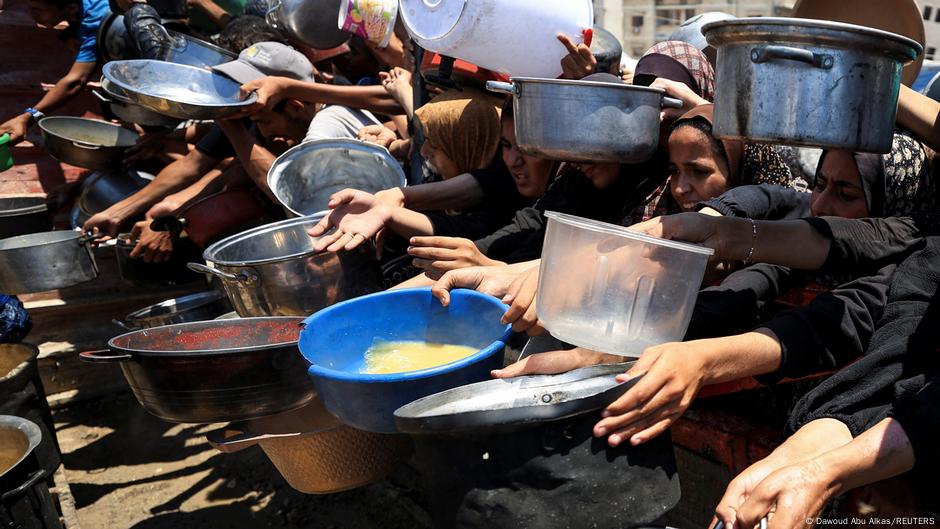
În contextul lipsurilor forțate din Gaza, palestinienii luptă pentru supraviețuire
“The day revolves around thinking about where to find food for my family,” said Raed al-Athamna, a displaced Palestinian father in Gaza City, who spoke to DW by phone since foreign journalists are not allowed in Gaza.
“There is nothing to eat. There is no bread, as I cannot afford to buy flour. It is too expensive. Today, we had some lentils for the kids and my mom, but tomorrow, I don’t know.”
Al-Athamna, who previously worked as a driver for foreign journalists in Gaza, said he no longer had the words to describe the situation. “There are Israeli airstrikes and shelling all the time. I’ve seen people fainting in the streets because they haven’t eaten. Social media is full of videos of people just collapsing.”
Israel begins new offensive in Gaza
To view this video please enable JavaScript, and consider upgrading to a web browser that supports HTML5 video
DW last spoke with al-Athamna in May, just after the Israeli government first permitted some aid trucks into Gaza after a nearly three-month blockade. At the time, he thought the situation could not get any worse for Gaza’s 2.1 million people.
Two months on, al-Athamna described the situation as “really bad. You cannot find a piece of bread, it is a very difficult situation. I am here with my grandkids, they are crying, they keep saying: ‘We want a piece of bread.’ And if you cannot give them anything, they don’t understand. This breaks your heart.”
International organizations sound alarm
International health and aid organizations have repeatedly sounded the alarm over conditions and the lack of vital supplies in Gaza during the 21-month conflict.
According to the UN humanitarian agency OCHA, almost 88% of Gaza is now under evacuation orders or designated as military zones. These areas include most of Gaza’s agricultural land, concentrating the displaced population in increasingly limited space and complicating humanitarian access.
World Health Organization chief Tedros Adhanom Ghebreyesus said Wednesday that a large proportion of Gaza’s population was starving. “I don’t know what you would call it other than mass starvation, it’s man-made and that’s very clear,” he stated.
Ross Smith, emergency director at the World Food Program (WFP), said Monday that Gaza’s hunger crisis “has reached new and astonishing levels of desperation.” He said that “a third of the population are not eating for multiple days in a row, this includes women and children.”
Gaza’s hunger crisis worsens amid ongoing Israeli offensive
To view this video please enable JavaScript, and consider upgrading to a web browser that supports HTML5 video
On Thursday, Gaza’s Hamas-run Health Ministry reported that so far in July 48 Palestinians had died from malnutrition, with 59 dying of malnutrition since the start of 2025. That number is up from 50 in 2024 and four in 2023 when Israel started its war against the Hamas militant group in Gaza following Hamas’ attack on southern Israel on October 7, 2023. Israeli officials have disputed such claims, characterizing them as propaganda.
Food prices surge amid scarcity
Eyad Amin, a father of three young children who has found shelter in Gaza City, is desperate. “Food is unavailable, and when it is available, it’s very expensive,” the 43-year-old told DW.
Amin, a former stationery shop owner, managed to buy some vegetables but at prices most people cannot afford. “Today I bought two potatoes, two tomatoes, and a few green peppers. These simple items cost me 140 shekels [around €36/base64,iVBORw0KGgoAAAANSUhEUgAAAAEAAAABCAQAAAC1HAwCAAAAC0lEQVR42mNkYAAAAAYAAjCB0C8AAAAASUVORK5CYII=” data-id=”73280915″ data-posterurl=”https://static.dw.com/image/73279633_605.webp” data-duration=”01:48″>
To view this video please enable JavaScript, and consider upgrading to a web browser that supports HTML5 video
Deliveries fall far short: aid groups
In March, Israeli authorities closed Gaza’s crossing, citing concerns about aid diversion by Hamas. These restrictions were partially lifted in May, with Prime Minister Benjamin Netanyahu claiming Israel was acting to prevent a “starvation crisis.”
Aid distribution shifted from established UN mechanisms to the controversial US-backed Gaza Humanitarian Foundation, which distributes pre-packed food boxes from three locations in Israeli-controlled militarized zones.
Urmărește cele mai importante știri
Currently, an average of 28 aid trucks enter Gaza daily, according to UN figures, which aid organizations have said falls short of population needs.
MedGlobal, a US-based NGO operating nutrition centers in Gaza, reported that “cases of acutely malnourished children have nearly tripled” since the beginning of July.
“There is no more buffer,” John Kahler, MedGlobal co-founder and a pediatrician who worked in Gaza last year, told DW. “When you get a virus suddenly you have diarrhea, that will push you over the edge because you don’t have any physical reserve left.”
“The terrible thing in Gaza,” he added, “is that everyone knows that food supplies are just 10 kilometers [6.2 miles] away.”
Israeli forces reportedly kill dozens in Gaza
To view this video please enable JavaScript, and consider upgrading to a web browser that supports HTML5 video
Looting, casualties increase as scarcity worsens
The Coordinator of the Government Activities in the Territories (COGAT), Israel’s military body overseeing crossings, told DW that “950 aid trucks are waiting on the Palestinian side” of entry points. The body claimed that Israel does not restrict humanitarian aid to Gaza, but did acknowledge “significant challenges in collecting trucks on the Gaza side.”
The UN has repeatedly said the backlog at the crossing was due to multiple difficulties, among them the coordination with the Israeli military. Trucks cannot move without their authorization, to ensure they can travel relatively safely from the crossing to the warehouse and distribution centers without coming under fire from the Israeli military.
Due to supply scarcity, looting has increased. On Sunday, a WFP convoy came under fire, resulting in casualties among people waiting for aid. In recent weeks, at least 875 people have been killed by Israeli fire while seeking aid at one of the distribution points by the Gaza Humanitarian Foundation or while waiting for UN trucks carrying supplies, according to the UN.
“I only went one time to get aid. But I don’t go anymore. If you are hit or injured, no one helps you. You will just die there. There is nothing in the hospitals to help you either,” said al-Athamna from Gaza City.
He added that the broader situation has become impossible. “You either die being bombed, or you die not having food. They keep talking to politicians about a ceasefire, but nothing happens, and things only get worse. What are we supposed to do?”
Edited by: Maren Sass, J. Wingard
Tania Krämer DW correspondent, author and reporter, based in Jerusalem.Send us your feedback
Sursa: DW
